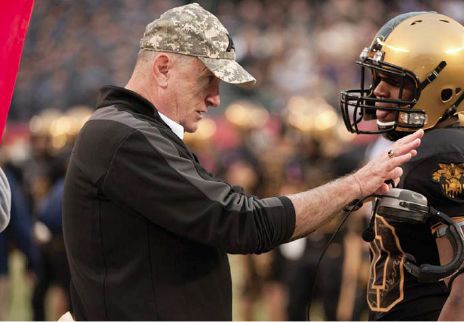Navy quarterback Keenan Reynolds scores in Saturday's 34-7 win over Army in Philadelphia, its 12th consecutive victory over West Point.
The last time Army beat Navy in their annual football clash was on Dec. 1, 2001. The 12 years since are just about as long as the U.S. has been in Afghanistan, where it has spent $700 billion and 2,293 U.S. lives trying to make the country unsafe for terrorists.
But only hours after the U.S. Military Academy’s Black Knights lost in their annual game with the Midshipmen from the U.S. Naval Academy, West Point fired Army football coach Rich Ellerson. It came on the heels of a 3-and-9 season, including last weekend’s 34-7 loss to Navy. The academy announced his departure with the same kind of terse statement that’s usually issued from a prison after an execution has been carried out:
Ellerson was notified of the decision Sunday evening after returning from Philadelphia following the Black Knights’ loss to Navy on Saturday.
Those with loved ones who have waged the seemingly interminable wars in Iraq and Afghanistan might wonder where such accountability was during the years of bloody wheel-spinning in both campaigns. “Blow a war, get a medal. Blow a football season, you’re toast,” concludes retired Army officer Ralph Peters. “One can only conclude that football is more important than warfare.”
That’s a glib response, to be sure, but there’s enough truth in it to sting. After all, the most famous cashiering of a U.S. military commander in the post-9/11 wars wasn’t due to sloppy missions in the sands of Iraq, or failing to beat down the Taliban in Afghanistan. It was President Obama’s 2010 decision to can Army General Stan McChrystal, who was running the Afghan campaign—after a couple of his aides, too drunk and naïve for their own good—privately dissed senior civilians in the U.S. government to a reporter.
In fact, some Army generals are not only not fired for lackluster performance in the field—they’re promoted. The Senate made General George Casey the service’s 36th chief of staff in 2007, after he commanded U.S. forces in Iraq for 30 water-treading months. Senator John McCain, a former Navy pilot and prisoner-of-war in Vietnam, questioned Casey’s judgment during the general’s confirmation hearing to serve as the Army’s top officer. The Arizona Republican rattled off a series of rosy projections Casey issued during his tenure in Iraq, none of which came true. Nonetheless, the Senate confirmed Casey to the top Army job, 83-14. “I don’t support promotion to higher position for failure,” McCain (an Annapolis grad, to be sure) said on the Senate floor. “To reward failure is going to send a message all around the military that I don’t think is a healthy one.”
Author Tom Ricks wrote The Generals last year about what he sees as the failure—of the nation, the government and superior officers—to hold the Army’s senior leaders accountable. “Privates are routinely punished for infractions,” he told Time when the book came out. “But as far as I can tell, no general has been fired for incompetence in combat since Major General James Baldwin was fired as commander of the Americal Division in 1971…Today being a general is like having tenure.”
The problem may be reflected in their respective paychecks. An Army four-star general earns $180,000 annually in basic pay, less than half Ellerson’s pre-firing salary of $410,500. (This can be a dangerous road to go down: Navy football coach Ken Niumatalolo has an annual salary of $1.5 million. But unlike the generals, who are paid by the taxpayers, the coaches are paid through separate, privately-funded athletic associations.)
The difference in accountability between generals and coaches reflects the views of U.S. society, especially when that society, lacking a draft, has so little skin in the game. “Americans pay far more attention to who wins or loses in football, than to the decisions generals make that waste blood and treasure,” says Douglas Macgregor, a retired Army colonel and bona fide military pot-stirrer. “What happens in a place remote from the United States, provided it does not affect the average American in a substantive way, is irrelevant.”
Now, back to the game…


